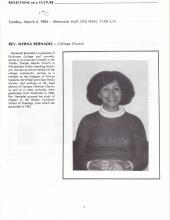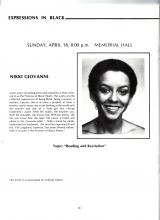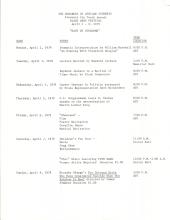Black Arts Festival Features Talented Female Choreographer
Dickinson College’s annual Black Arts Festival or Multicultural Fair featured a concert by The Philadelphia Dance Company “Philadanco†on Sunday, March 6, 1988. The company, which was comprised of predominantly black dancers, presented a program of five pieces of contemporary choreography. The only female choreographer of the bunch was Elisa Monte; her piece was entitled “Dream Time.â€





